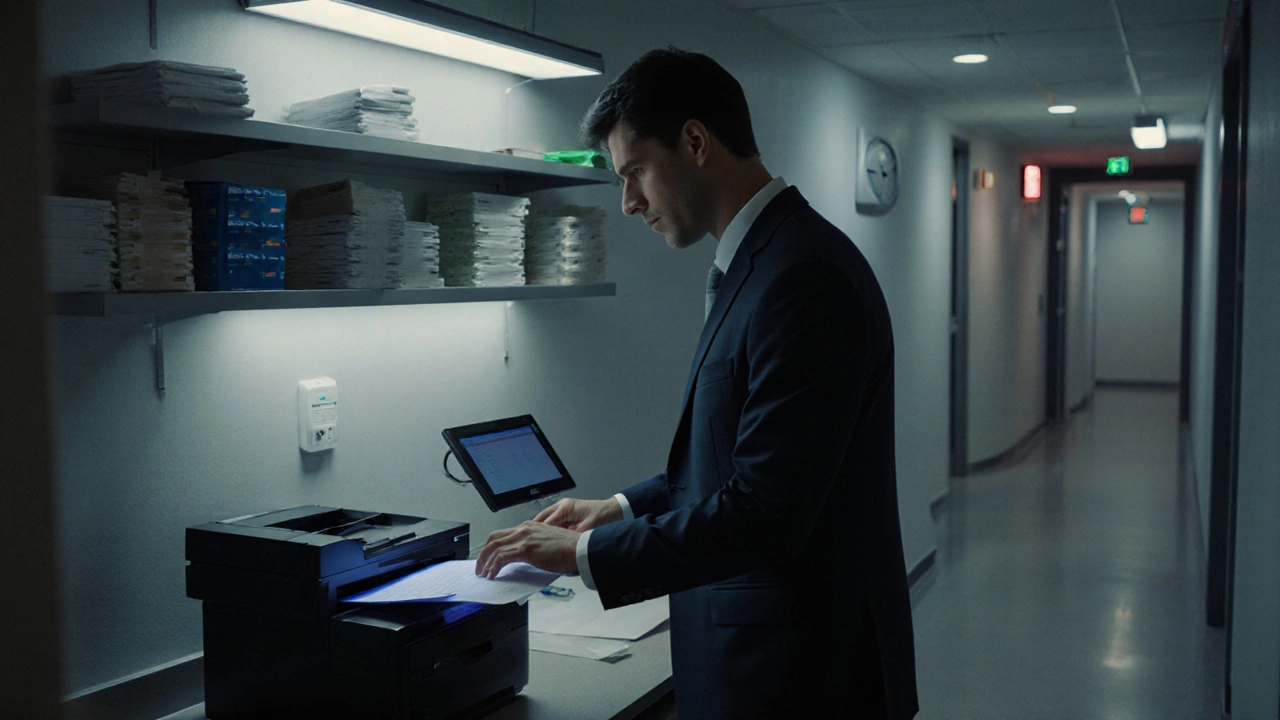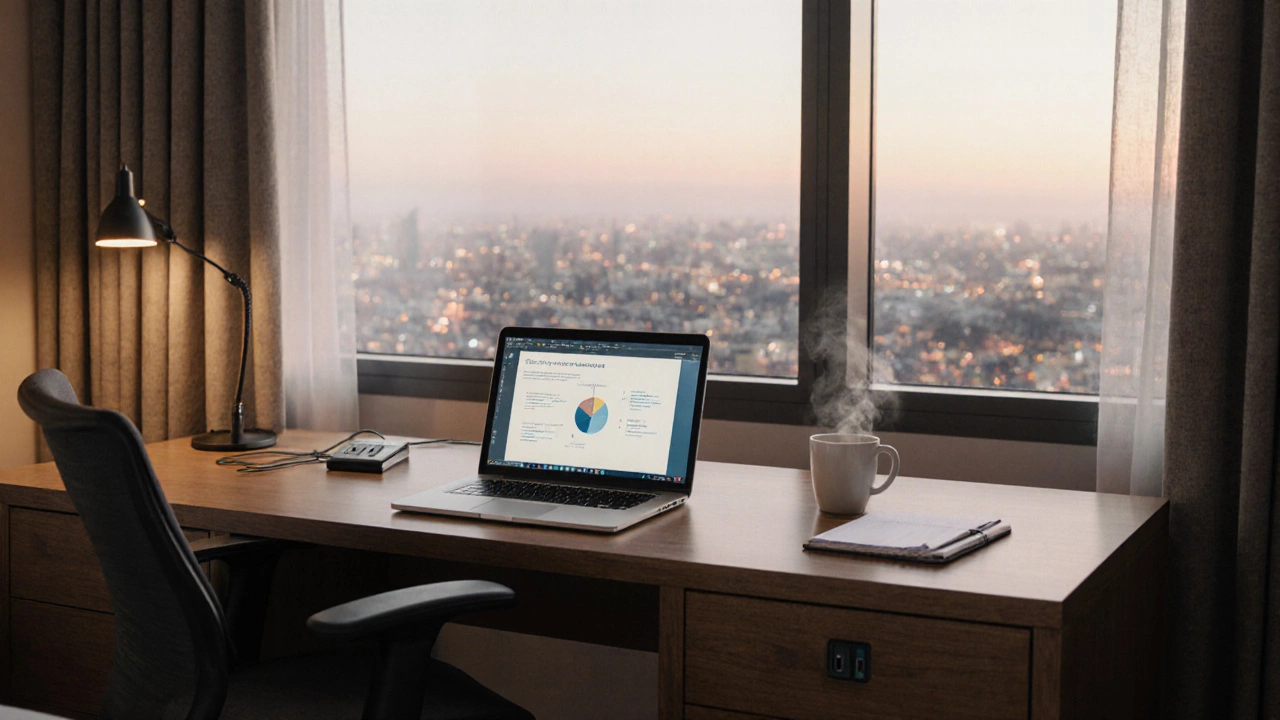Business Hotel Feature Calculator
Find Your Ideal Business Hotel
Rate each feature based on your travel priorities. Your input will generate a personalized score to help you choose the best business hotel for your needs.
Your Feature Priorities
Your Results
Enter your priorities to see your results
How This Works
This calculator helps you evaluate business hotels based on your specific needs. We've weighted each feature according to your priorities and compared them against industry standards. Your score is based on how well your top priorities match what business hotels typically offer.
When you’re traveling for work, you don’t need a poolside cabana or a spa menu. You need a bed that doesn’t creak, fast Wi-Fi that actually works, and a desk where you can finish your presentation before your 8 a.m. meeting. That’s what a business hotel is built for.
What Exactly Is a Business Hotel?
A business hotel, also called a commercial hotel, is designed specifically for professionals on short-term trips. These aren’t luxury resorts or family-friendly chains. They focus on efficiency, reliability, and convenience. You’ll find them near airports, downtown business districts, conference centers, and transportation hubs.
Unlike regular hotels that try to be everything to everyone, business hotels streamline their offerings. They cut the extras - like kids’ clubs or themed rooms - and double down on what matters to someone working on the road: workspace, connectivity, and consistency.
Think of it this way: if you’re flying into Chicago for a three-day client meeting, you’re not looking for a rooftop bar with live jazz. You’re looking for a room where you can print documents, join a Zoom call without lag, and get breakfast before 6 a.m. That’s the core promise of a business hotel.
Key Features You’ll Find in a Business Hotel
Not all hotels that say "business-friendly" actually deliver. Here’s what real business hotels include - and what they don’t.
- Workspaces: Every room has a sturdy desk, ergonomic chair, and at least two power outlets. Many include built-in USB ports and cable management systems.
- High-speed internet: Free, reliable Wi-Fi isn’t optional - it’s guaranteed. Most offer speeds of 100 Mbps or higher, with dedicated business networks for video conferencing.
- 24/7 business centers: Printers, scanners, copiers, and fax machines are available anytime. No more hunting for a copy shop at midnight before a presentation.
- Early check-in and late checkout: Flights don’t run on hotel schedules. Most business hotels let you check in as early as 6 a.m. and check out as late as 2 p.m. without extra charge.
- On-site dining for professionals: Breakfast is served from 5:30 a.m. to 10 a.m. with grab-and-go options. Lunch and dinner menus are simple - salads, sandwiches, grilled proteins - not five-course tasting menus.
- Meeting rooms and conference spaces: Small rooms for two people, medium rooms for six, and larger spaces for teams. All come with projectors, microphones, and tech support.
- Quiet floors: Separate wings or floors reserved for business travelers. No loud parties, no kids running down the hall at 11 p.m.
What’s missing? Mini-bars stocked with overpriced snacks, giant tubs you’ll never use, and rooms designed for Instagram photos. Business hotels know you won’t care about the art on the wall - you care about whether the coffee machine works.
Who Uses Business Hotels?
It’s not just CEOs and sales reps. Business hotels serve a wide range of professionals:
- Consultants: Traveling weekly between client sites, they need consistent quality and predictable pricing.
- Field engineers: Working on construction sites or factory repairs, they need a place to charge tools, store equipment, and rest after long shifts.
- Trainers and educators: Conducting workshops in different cities, they need reliable tech and quiet spaces to prep materials.
- Journalists and media crews: Need fast internet, power outlets, and rooms that can double as impromptu interview spaces.
- Government and military personnel: Often on official travel, they rely on standardized amenities and secure networks.
These aren’t people looking for a vacation. They’re looking for a functional base. And they’re willing to pay for it - but only if it delivers.

Business Hotels vs. Regular Hotels: What’s the Difference?
It’s easy to confuse a business hotel with a standard chain hotel. But the differences are real - and they matter.
| Feature | Business Hotel | Standard Hotel |
|---|---|---|
| Room layout | Desk facing window, minimal clutter, no distractions | Bed-centered, decorative furniture, sometimes no dedicated workspace |
| Internet | Guaranteed 100+ Mbps, business-tier network | Basic Wi-Fi, often throttled during peak hours |
| Breakfast | Starts at 5:30 a.m., grab-and-go options, coffee available 24/7 | Buffet from 7-10 a.m., seated service only |
| Check-in/out | Flexible, early/late options included | Strict 3 p.m. check-in, 11 a.m. check-out |
| Meeting spaces | Available daily, bookable by the hour | Only for events, requires booking days in advance |
| Noise policy | Quiet floors enforced, no late-night parties | No restrictions, may be near party zones |
The bottom line? Standard hotels are for leisure. Business hotels are for getting work done - no matter the time zone or time of day.
Top Business Hotel Brands You Can Trust
There are dozens of chains that specialize in business travel. Here are the most widely used globally:
- Hyatt Place: Known for free breakfast, 24/7 food and drink stations, and modern workspaces.
- Hampton by Hilton: Reliable Wi-Fi, free hot breakfast, and consistent room layouts across locations.
- Marriott Courtyard: Strong business centers, flexible meeting spaces, and loyalty program integration.
- InterContinental Hotels Group (IHG) Business Class: Includes brands like Holiday Inn Express and Crowne Plaza - focused on efficiency and corporate billing.
- Accor’s ibis Styles Business: Popular in Europe and Australia, sleek design, compact but functional rooms.
These chains don’t just offer rooms - they offer systems. Corporate travelers can book through company portals, get centralized billing, track expenses, and earn loyalty points that convert to free nights or upgrades.
How to Pick the Right Business Hotel
Not all business hotels are created equal. Here’s how to choose one that actually fits your needs:
- Check the location: Is it within 10 minutes of your meeting spot? Proximity beats luxury every time.
- Test the Wi-Fi: Look for reviews mentioning Zoom calls or video conferencing. If people complain about buffering, walk away.
- Look at the room photos: Real photos - not staged ones. Does the desk face a window? Is there space for your laptop and documents?
- Read the breakfast details: Is it really available at 5:30 a.m.? Or is it a buffet that starts at 7 a.m. with a 30-minute wait?
- Check the cancellation policy: Business trips change. Make sure you can cancel or modify without penalty.
Pro tip: Use your company’s preferred vendor list. Most corporations have negotiated rates with specific chains - you’ll save money and simplify expense reports.
Why Business Hotels Are More Important Than Ever
In 2025, hybrid work isn’t a trend - it’s the norm. Professionals split time between home, office, and the road. That means more overnight stays, more last-minute bookings, and more pressure on hotels to perform.
Business hotels have adapted. Many now offer:
- Mobile check-in and keyless room entry via app
- Smart thermostats and lighting controlled from your phone
- On-demand laundry pickup and return
- Integration with calendar apps to auto-schedule wake-up calls or room service
They’re not trying to impress you. They’re trying to make your workday smoother.
What to Avoid
Some hotels market themselves as "business-friendly" but fall short. Watch out for:
- "Business center" that’s just a corner with one printer and no staff
- Wi-Fi that requires a login code you can’t get until 9 a.m.
- Rooms without windows or natural light - they’re often near elevators or boiler rooms
- Breakfast that ends at 8 a.m. - useless if your flight lands at 6:45 a.m.
- No 24-hour front desk - what happens if you arrive at 2 a.m.?
If you’ve been burned before, trust your experience. If a hotel doesn’t mention business amenities upfront, it probably doesn’t prioritize them.
Final Thought: It’s Not About Luxury - It’s About Control
When you’re on a business trip, your time is your most valuable asset. A good business hotel doesn’t give you a bathrobe or chocolates on the pillow. It gives you back control: control over your schedule, your environment, and your productivity.
That’s why professionals keep coming back - not for the view, but for the reliability.
Are business hotels more expensive than regular hotels?
Not necessarily. Business hotels often have higher base rates than budget chains, but they’re usually cheaper than luxury resorts. Many corporate travelers pay through company accounts with negotiated discounts, so out-of-pocket costs can be lower. You’re paying for reliability, not extras.
Can I use a business hotel for leisure travel?
Yes, but you might feel like you’re missing out. Business hotels don’t have pools, spas, or themed rooms. If you’re traveling for fun and want to relax, you’ll be happier at a resort or boutique hotel. But if you’re traveling solo and just need a clean, quiet place to sleep and work, a business hotel works fine.
Do business hotels offer free breakfast?
Most do - and it’s usually included in the rate. But don’t assume it’s a buffet. Many offer grab-and-go options like pastries, fruit, yogurt, and coffee. Some have hot items like eggs and bacon, but only during limited hours. Always check the details before booking.
What’s the difference between a business hotel and a corporate hotel?
There’s no real difference - the terms are used interchangeably. "Corporate hotel" sometimes implies a stronger tie to company contracts and billing systems, while "business hotel" is more about the traveler’s needs. In practice, both mean the same thing: a place built for work, not play.
Do business hotels have gyms?
Some do, but it’s not a priority. Many have small fitness areas with a treadmill, stationary bike, and free weights - enough for a quick 20-minute workout. If you need a full gym with classes or pools, look elsewhere. Business travelers typically prioritize function over fitness.
If you’re traveling for work, choose a hotel that respects your time - not one that tries to sell you a vacation.

